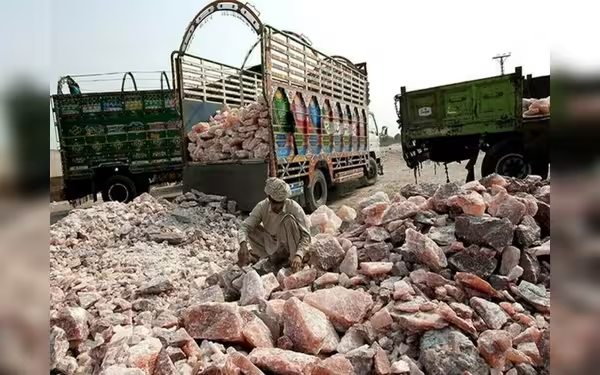Saturday, November 16, 2024 09:31 PM
SMAP Raises Alarm Over Punjab's Proposed Pink Salt Export Ban
- SMAP criticizes government's lack of consultation on salt export ban.
- Industry leaders warn of economic repercussions from abrupt decisions.
- Call for collaborative approach to ensure sustainable growth.
 Image Credits: brecorder
Image Credits: brecorderSMAP raises concerns over Punjab's proposed ban on raw pink salt exports, urging government consultation for sustainable industry growth.
The Salt Manufacturers Association of Pakistan (SMAP) is currently facing a significant challenge following a recent announcement by the Chief Minister of Punjab, Maryam Nawaz Sharif. The Chief Minister has proposed a ban on the export of raw pink Himalayan salt, a move that has raised serious concerns among industry stakeholders. During a meeting aimed at maximizing revenue from pink salt exports, the Chief Minister directed officials to devise a plan for establishing a value-added industry for this precious mineral. However, her statement to 'ban the export of raw pink salt' has sparked a wave of criticism from key figures in the salt industry.
Ismail Suttar, the Founding Chairman of SMAP, has openly expressed his disappointment with the government's approach. He described the announcement as 'immature' and criticized the lack of consultation with those directly involved in the salt industry. Suttar stated, 'It is very unfortunate to witness repeated mistakes by the government, leading the industry towards a destructive path.' His remarks highlight a growing frustration among industry leaders who feel sidelined in discussions that could have profound economic implications.
According to Suttar, the salt industry was anticipating a meeting with the Punjab government to discuss the potential impacts of such a ban before any final decisions were made. He emphasized the importance of including private industry stakeholders in discussions that could significantly affect their livelihoods. 'We are already drowning in debt and cannot afford politicized decisions,' he remarked, pointing out that 70% of Pakistan's mining activities are conducted by the private sector, while only 30% are managed by government entities like the Pakistan Minerals Development Corporation (PMDC).
Suttar further elaborated on the complexities of value addition in the minerals sector, noting that it requires time, investment, and thorough research. He drew a comparison with Indonesia's trade minister, Muhammad Lutfi, who took a year to consult stakeholders before implementing a ban on raw nickel exports. This careful approach, he argued, allows industries to adapt to new market demands, contrasting sharply with the abrupt decisions that could jeopardize Pakistan's salt industry.
While SMAP is not against the idea of increasing value-added exports, Suttar insists that the government should also focus on other high-value minerals such as lithium, rare earths, bromine, and sulfate of potash, which have greater export potential. The association's concern is not solely about the potential benefits of a ban on raw salt exports but rather about the government's decision-making process. 'We request the government to keep concerned stakeholders in the loop before making any unreasonable decisions that could jeopardize the country’s remaining exports,' Suttar stated.
Currently, raw pink salt is sold by lessees at approximately $20 per ton, while its price in international markets exceeds $10 per kilogram. The Punjab government estimates that banning raw salt exports and developing a value-added industry could generate up to $13 billion over the next 3-5 years, a significant increase from the current annual revenue of $5 million. Despite this optimistic outlook, industry leaders like Suttar remain skeptical, urging the government to adopt a more consultative approach before implementing policies that could have far-reaching consequences for Pakistan's struggling economy.
The proposed ban on raw pink salt exports has ignited a critical debate about the future of Pakistan's salt industry. As stakeholders voice their concerns, it becomes increasingly clear that a collaborative approach is essential for sustainable growth. The government must consider the insights and experiences of those directly involved in the industry to ensure that any decisions made will benefit not only the economy but also the livelihoods of countless individuals dependent on this vital sector.













